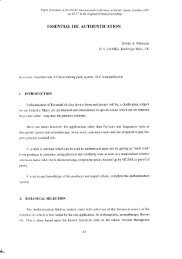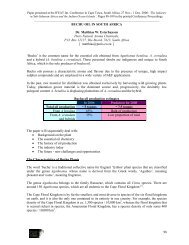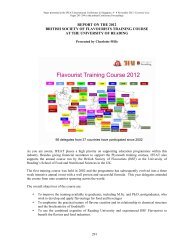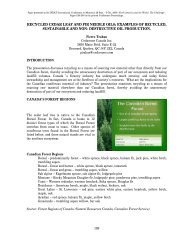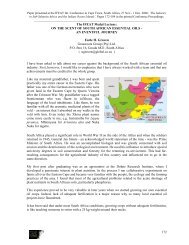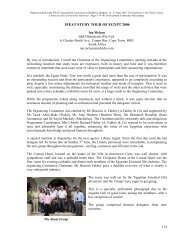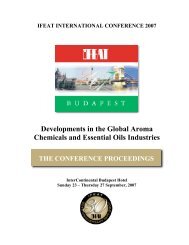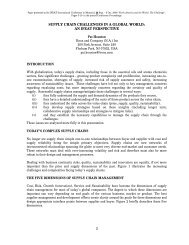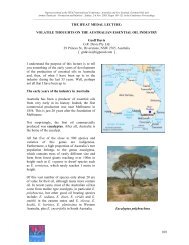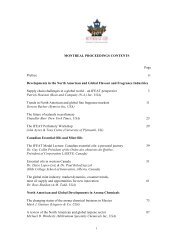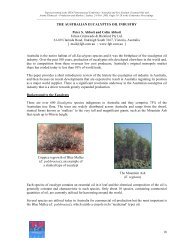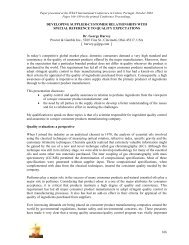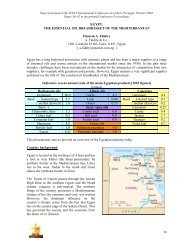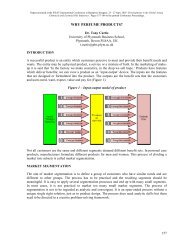- Page 1 and 2:
IFEAT INTERNATIONAL CONFERENCE 2012
- Page 3 and 4:
CONTENTSPREFACEvRavi Sanganeria, Ch
- Page 5:
IFEAT BUSINESS 283IFEAT Annual Repo
- Page 8 and 9:
On the last day of the conference,
- Page 11 and 12:
A VIEW OF MENTHOL DEVELOPMENT- FROM
- Page 13 and 14:
There is a highly educated workforc
- Page 15 and 16:
eturn, say, mint, in this case. In
- Page 17 and 18:
By 2001, mint production had declin
- Page 19 and 20:
Uttar Pradesh (UP)UP is India’s m
- Page 21:
Mint ProductionThe graph illustrate
- Page 25 and 26:
The table provides an example of th
- Page 27 and 28:
RECENT TRENDS AND FUTURE CHALLENGES
- Page 29 and 30:
Compared to the giants in synthetic
- Page 31:
THANK YOU &HAVE A NICE DAY!Mr "Gats
- Page 34 and 35:
An intriguing element of this myste
- Page 36 and 37:
This will produce significant, if u
- Page 38 and 39:
Rising UrbanizationIndia has 70% of
- Page 40 and 41:
Systemic Drivers for Sectoral Growt
- Page 42 and 43:
LuxuryIndia’s luxury market is st
- Page 44 and 45:
Growth Projection of F&F MarketOver
- Page 46 and 47:
The rewards for those who innovate,
- Page 48 and 49:
&!!"%#!"!"#$%&'()##)*+',-'.'%!!"$#!
- Page 50 and 51:
Within the total area of 2.94 milli
- Page 52 and 53:
The methodologies include training
- Page 54 and 55:
• Protective microorganisms• Na
- Page 56 and 57:
Figure 18 : Centritherm - Thin Film
- Page 59 and 60:
S. Palaniswamy RajaJasmine C. E. Pv
- Page 61 and 62:
Such cultivation and use of flowers
- Page 63 and 64:
The floral fragrance products in th
- Page 65 and 66:
(b) Sambac(b)SambacJasminum sambac
- Page 67 and 68:
(d) Mimosa(d)MimosaAcacia mearnsii
- Page 69:
FUTUREBesides the long tradition, t
- Page 72 and 73:
Geographically the state is divided
- Page 74 and 75:
This table below shows the volume o
- Page 76 and 77:
Main ConstituentsThe main constitue
- Page 78 and 79:
INDIAN CALAMUS OILThe botanical nam
- Page 80 and 81:
TAGETES OILThe botanical name is Ta
- Page 82 and 83: JUNIPER BERRY OILThe botanical name
- Page 84 and 85: Odour ProfileBalsamic, woody, herba
- Page 86 and 87: This oil is one important component
- Page 88 and 89: Various improvements in the cultiva
- Page 91 and 92: CHINA’S FLAVOUR AND FRAGRANCE IND
- Page 93 and 94: In my presentation today I intend t
- Page 95 and 96: These figures show theproportionate
- Page 97 and 98: Enterprises have to pay close atten
- Page 99 and 100: OVERVIEW OF THE CHINESE GUM TURPENT
- Page 101 and 102: The abundant pine forests in China
- Page 103 and 104: Chinese GT Industry PerspectiveOleo
- Page 105 and 106: faded out, which was equivalent to
- Page 107 and 108: The GT derivatives industry has bee
- Page 109 and 110: Acknowledgements• Mr. Lin Like, P
- Page 111 and 112: ANETHOLE DEVELOPMENT TRENDSHuang Zo
- Page 113 and 114: INDUSTRIAL PRODUCTION OF ANETHOLEAn
- Page 115 and 116: hydrate (KOH), then anethole is gai
- Page 117 and 118: output of anethole is calculated to
- Page 119 and 120: price and supply of synthetic helio
- Page 121 and 122: !!!!!!!!!!!THE ESSENTIAL OIL INDUST
- Page 123 and 124: !!"#$%&'(')%*+,-(((The graphs below
- Page 125 and 126: Pepper OilPepper, which is known as
- Page 127 and 128: 15Crop production: 2,700 mtOil expo
- Page 129 and 130: vated as a mono crop in the Central
- Page 131: distillation units there are 135 fi
- Page 135 and 136: THE FLAVOUR AND FRAGRANCE INDUSTRY
- Page 137 and 138: THANK YOU!!!!!!!!!!!!!!!!!!!!!!!!!!
- Page 139 and 140: INTRODUCTIONOVERVIEW OF THE AGARWOO
- Page 141 and 142: AQUILARIA SPECIES PRODUCES AGARWOOD
- Page 143 and 144: RESINOUS COMPOUNDSSome of these che
- Page 145 and 146: OIL QUALITY GRADINGCurrently, there
- Page 147 and 148: VALUE ADDITIONIN THE INDONESIAN FLA
- Page 149 and 150: !"#$$%&'%()*&)+#$,%)-..*&'))!""#$%&
- Page 151 and 152: MARKETING TRENDS OF AMBIENT SCENTIN
- Page 153 and 154: Our fragrance partner is Drom with
- Page 155 and 156: Hong KongHong Kong is the home to t
- Page 157 and 158: Sustainability and Market Issues149
- Page 159 and 160: INTRODUCTIONSUSTAINABLE SUPPLYA CON
- Page 161 and 162: The internet age has dramatically c
- Page 163 and 164: Similarly, our customers want to kn
- Page 165 and 166: A critical part of Performance with
- Page 167 and 168: Earlier I talked about how our bran
- Page 169 and 170: INTRODUCTIONEFFORTS AND CHALLENGES
- Page 171 and 172: The following table provides an ove
- Page 173 and 174: price has recovered to normal andpr
- Page 175 and 176: The activities of the patchouli pil
- Page 177 and 178: CONCLUSIONSIn conclusion, consideri
- Page 179 and 180: THE INGREDIENTS SUPPLY CHAIN:PAST A
- Page 181 and 182: HOW HAVE BUYERS AND SUPPLIERS CONNE
- Page 183 and 184:
Let’s take a look at a few of the
- Page 185 and 186:
Illustrative example of a total ind
- Page 187 and 188:
ERP solution is provided as well as
- Page 189 and 190:
Traceability from the origin and ve
- Page 191 and 192:
Those who embrace this new dynamic
- Page 193 and 194:
New Sources of Natural Ingredient S
- Page 195 and 196:
AROMA CHEMICALS FROM THE TROPICS VI
- Page 197 and 198:
FROM BIOMATERIALS TO OLEOCHEMICALSB
- Page 199 and 200:
Bioconversion of coconut oil to est
- Page 201 and 202:
Shao Quan LIU is an Assistant Profe
- Page 203 and 204:
BIOTECHNOLOGY AND THE CHANGING ROLE
- Page 205 and 206:
Why is this so important to us? How
- Page 207 and 208:
and in the San Francisco Bay area (
- Page 209 and 210:
The tools that have been developed
- Page 211 and 212:
CAN BIO-SYNTHETIC BIOLOGY BE THE NE
- Page 213 and 214:
!"#$"%&'(#)(*+,%(-&.%,+(*%$&contain
- Page 215 and 216:
!"#$%&'(')*+",-.*/+01&')&23".4.56'7
- Page 217 and 218:
small additive, wherein you could h
- Page 219 and 220:
And you can see that any of these c
- Page 221 and 222:
Dr. P M Murali, is the Managing Dir
- Page 223 and 224:
Regulatory Issues215
- Page 225 and 226:
THE SOCIO-ECONOMIC IMPORTANCE OF TH
- Page 227 and 228:
The issues affecting the fragrance
- Page 229 and 230:
THE IFRA SOCIO-ECONOMIC ANALYSIS PR
- Page 231 and 232:
So we have taken this grid, and est
- Page 233 and 234:
The data have been broken down betw
- Page 235 and 236:
Nevertheless, it’s the SCCS, so D
- Page 237 and 238:
wolf: “Ah we can’t do anything,
- Page 239 and 240:
The process would be to start from
- Page 241 and 242:
I will not bore you with all of the
- Page 243 and 244:
REACH: AN UPDATE OF EFEO’S PROGRA
- Page 245 and 246:
Based on the 2005 survey 47 NCSs ar
- Page 247 and 248:
Therefore, all manufacturers and su
- Page 249 and 250:
As a result of EFEO’s phase-2 ini
- Page 251 and 252:
EXPERIENCESThe data requirements fo
- Page 253 and 254:
• exposure and risk assessment•
- Page 255 and 256:
EFEO - THE FIRST DECADE AND BEYONDP
- Page 257 and 258:
!"#$%&'()&*!+,&-($)#.&/&"*,!(0.& .1
- Page 259 and 260:
!"#$%&'($")*$)&+&,+%-.!/)• '""$0"
- Page 261 and 262:
Country and Other Studies253
- Page 263 and 264:
THE FLAVOUR AND FRAGRANCE INDUSTRY
- Page 265 and 266:
Major business activity is still co
- Page 267 and 268:
Important service provided by local
- Page 269 and 270:
F&F BUYERS - DOMESTIC MARKETIn the
- Page 271 and 272:
ingredients are in demand. The aver
- Page 273 and 274:
Household chemicalsSince the late 1
- Page 275 and 276:
Consumers’ habits are also changi
- Page 277 and 278:
Alcoholic beveragesThe most popular
- Page 279 and 280:
BIBLIOGRAPHY1. http://www.gks.ru/fr
- Page 281 and 282:
IMPROVED IDENTIFICATION METHODS FOR
- Page 283 and 284:
Australian aboriginals have used th
- Page 285 and 286:
Another interesting point is thenum
- Page 287 and 288:
perform a chiral test on these comp
- Page 289 and 290:
If you are buying oil in 185 kgs st
- Page 291 and 292:
IFEAT Business283
- Page 293 and 294:
IFEAT ANNUAL REPORT 2011Ramon Borda
- Page 295 and 296:
INTRODUCTIONICATS / PLYMOUTH UNIVER
- Page 297 and 298:
A key ICATS activity, supported by
- Page 299 and 300:
REPORT ON THE 2012BRITISH SOCIETY O
- Page 301 and 302:
As the course progresses, flavour c
- Page 303 and 304:
BRAZIL & PARAGUAY IFEAT STUDY TOUR
- Page 305 and 306:
After the return of the boat, we dr
- Page 307 and 308:
Saturday was one the highlights of
- Page 309 and 310:
IFEAT 2013 SAN FRANCISCO CONFERENCE
- Page 311 and 312:
The Fairmont has excellent dining f
- Page 313 and 314:
VISASWhat is IFEAT proposing to do?
- Page 315 and 316:
THE IFEAT 2013 STUDY TOUR TO SOUTH
- Page 317 and 318:
Sunday 9th JuneParticipants arrive
- Page 319 and 320:
Friday 14th June - Day 5Friday 14th
- Page 321 and 322:
Monday 17th June - Day 8In the morn
- Page 323 and 324:
INTRODUCTIONICATS INTERMEDIATE PERF
- Page 325 and 326:
WHY FRAGRANCE PRODUCTS?There is onl
- Page 327 and 328:
In this paper for the conference pr
- Page 329 and 330:
FRAGRANCE CREATIONThis was a short



